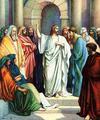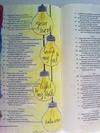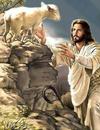Psalm 1 Part 1 of 3
by John Lowe
(Woodruff, S.C.)

11-10-13
Tom Lowe
Psalm 1
1 Blessed is the man that walketh not in the counsel of the ungodly, nor standeth in the way of sinners, nor sitteth in the seat of the scornful.
2 But his delight is in the law of the LORD; and in his law doth he meditate day and night.
3 And he shall be like a tree planted by the rivers of water, that bringeth forth his fruit in his season; his leaf also shall not wither; and whatsoever he doeth shall prosper.
4 The ungodly are not so: but are like the chaff which the wind driveth away.
5 Therefore the ungodly shall not stand in the judgment, nor sinners in the congregation of the righteous.
6 For the LORD knoweth the way of the righteous: but the way of the ungodly shall perish.
Introduction
Psalm 1 is a wisdom Psalm and focuses on God’s Word, God’s blessing on those who obey it and meditate on it, and God’s ultimate judgment on those who rebel. Wisdom Psalms also wrestle with the problem of evil in the world and why God permits the prosperity of the wicked who reject His Law. Other wisdom Psalms include 10, 12, 15, 19, 32, 34, 37, 49, 50, 52, 53, 73, 78, 82, 91, 92, 94, 111, 112, 119, 127, 128, 133, and 139. While this psalm depicts two ways, it actually describes three different persons and how they relate to the blessings of the Lord.
This psalm combines two characteristic interests of postexilic Judaism, the trend toward legalism and the teaching concerning retribution. And the trend in the psalm toward the Law and its study points to a time of origin of around 397 B.C. when the priestly law was introduced to the restored community in Jerusalem and Judah. The psalm was placed first because it was intended to be an introduction to the book of Psalms as a whole. How relevant, then, is its portrayal of the two ways of life which are differentiated with such variety and sharpness in the Psalter! The good man (blessed man) becomes stable, gracious, and prosperous; the evil man becomes empty, futile, and forgotten.
Commentary
1 Blessed is the man that walketh not in the counsel of the ungodly, nor standeth in the way of sinners, nor sitteth in the seat of the scornful.
God’s covenant with Israel made it clear that He would bless their obedience and judge their disobedience (Lev. 26, Deut. 28). The word “blessed” is asher, the name of one of Jacobs sons (Gen. 30.12, 13)i. The person described here met the conditions, and therefore God blessed him. If we want God’s blessing, we too must meet the conditions.
Religious life is the “blessed” life: and blessedness is more than happiness. The blessed man is right withGod and enjoys the spiritual peace and joy that results from that relationship. “The man that walketh not in the counsel of the ungodly” is the man that does not live his life according to their advice, or direction, or manner of living; who does not associate with them nor follow their evil promptings or examples. The term “walking” as it is used here means choosing, and making progress or continuing in it. “Nor standeth” denotes hardness and obstinacy. “In the way” means their course of action, or manner of conversation; in the practice of those things which they chose to do, which is sometimes called a man’s way (Ps. 25.4ii). “Of sinners” are those who give up themselves to the power and practice of sin; making it their great concern and delight. “Nor sitteth in the seat” denotes their association or incorporation of themselves with them, a constant and resolved perseverance in their wicked choices, with great content and security; and a great proficiency and eminence in the school of wickedness, and an ability and readiness to lead others to come along with them. “Of the scornful” refers to those who are not only diseased with sin, but reject, despise, and ridicule all remedies; who poke fun at sin and at God’s threatenings and judgments against sinners; who feel it’s their duty to laugh at goodness and good men.
This verse states the practice of the blessed man. A bit further in the psalm, we will see the power of the blessed man, and finally his permanency. In this verse, we see the negative side of the practice of the blessed man. We are told what the happy man does NOT do. Here we see three positions or postures. Blessed is the man, or happy is the man, who does not walk in the counsel of the ungodly, or stand in the way of sinners, nor set in the seat of the scornful. The person who does these things is not a happy person. He goes through three stages. First he associates with the ungodly, then he gets in with sinners, and finally, he joins in with the scornful. There was a pastor at a church I attended at one time who liked to say, “Sin will always take you farther than you want to go.” That is what happens to this unfortunate sinner.
There is definitely regression, degeneration, and deterioration here. The blessed man does not walk in the counsel of the ungodly. Counsel means “advice.” He does not listen to the ungodly. Did you ever notice that even the Lord Jesus never referred to His own reason or His own mind as a basis for a decision? Whatever He did was based on the will of God. He never said to His disciples, “Men we are going into Galilee again. I have been thinking this over, and I am smarter than you fellows, and I think this is the best thing to do according to my point of view.” That is not the way He approached His disciples. He always said, “I am going to Jerusalem because it is the will of My Father.” He spent time with His Father and knew what His will was and moved into certain areas on that basis
My friend, it is one thing to listen to counsel, and good counsel is fine, but certainly not the counsel of the ungodly. We are to walk by faith. Listening to the counsel of the ungodly is not walking by faith. Who are the ungodly? They are the people who just leave God out. There is no fear of God before their eyes. They live as though God does not exist. There are multitudes of people like this around us today. They get up in the morning, never turn to God in prayer, never thank him for the food they eat, or for life or health. They just keep going on living it up. They are ungodly—they just leave God out.
The ungodly counsels the man, and now we find him standing in the way of sinners. It is the sinner who takes him from there. Sin means to “miss the mark.” They don’t quite live as they should. They are the ones Scripture speaks of when He says, “There is a way which seemeth right unto a man, but the end thereof are the ways of death” (Prov. 14.12). Again the scriptures say, “All the ways of a man are clean in his own eyes; but the LORD weigheth the spirits” (Prov. 16.2). The sinner may think he’s alright, but he is a sinner. God’s Word says, “Let the wicked forsake his way, and the unrighteous man his thoughts: and let him return unto the LORD, and he will have mercy upon him; and to our God, for he will abundantly pardon” (Isa. 55.7). Also, it says, “All we like sheep have gone astray; we have turned every one to his own way; and the LORD hath laid on him the iniquity of us all” (Isa. 53.6). The Father laid on the Lord Jesus all the weight of our guilt. We are sinners. That’s our picture.
The next step down from standing in the way of sinners is setting in the seat of the scornful. The scorners are atheists. Now the sinner gets the young man to set down. We are told that the third stage is that he sets in the seat of the scornful. The scornful is the atheist. He not only denies God, but he exhibits an antagonism and a hatred of God. We see this on every hand today. The scornful—they’re the ones who are absolutely opposed to God. They don’t want the Bible read in public schools or anywhere else, and they want to take “under God” out of the Pledge of Allegiance. They deny the Word of God. May I say to you that there is nothing lower than to deny God. The drunkard in the gutter today is not nearly as low as the man who is denying God. And if you want to know God’s attitude, here it is, “Surely he scorneth the scorners: but he giveth grace unto the lowly” (Prov. 3.34). God is opposed to the scornful, and He will scorn them. That is a very frightful picture, by the way, which we are presented with here.
Now, this is the negative side. This is what the happy man does not do. In the next verse, we see what the happy man does do.
2 But his delight is in the law of the LORD; and in his law doth he meditate day and night.
Verse 2 gives the positive side of the saint and declares the kind of thoughts he is free to entertain in his life. His pleasure is to think God’s thoughts, which he can know by studying His Word. The thoughts he entertains are thoughts to which he could call the Lord’s attention. Moreover, he is a man who wills himself to meditate on the issues of life, which is something our fast-paced society needs to remember. Where there is a will to meditate there is both time and a way.
“In the Law” means the study and practice of it, which is how it appears from the context. Here, the Law of God may be understood to mean the whole doctrine delivered by God to the Church consisting of doctrines, precepts, promises, and threatenings, which are to be stored in the heart according to Psalm 37.31iii. This is a characteristic of a good man that he delighteth himself not only with the promises, which a bad man may do (Matt. 13.20iv), but even with the commands of God (Ps. 112.1v), which are unwelcome and burdensome to a wicked man. A godly person is not influenced by unrighteous people but by his meditation on the Word of God. Such meditation necessarily involves study and retention. This is possible only if he has a desire to do so, which is referred to here as a delight.
No content on preachology.com may be printed or
copied to any other site without permission.
|
The Preaching Ezine Subscribe to my free newsletter for monthly sermons and get a free book right now. Just follow the link above and get the details! |
|
Sermon Supply Ministry
Be ready for Sunday…before Saturday night! |
|
Manna Seminary
Did you ever want to start or finish your Ministry Training? |
|
YOUR PAGES: by sharing YOUR great sermons! by sharing YOUR great poems! |










